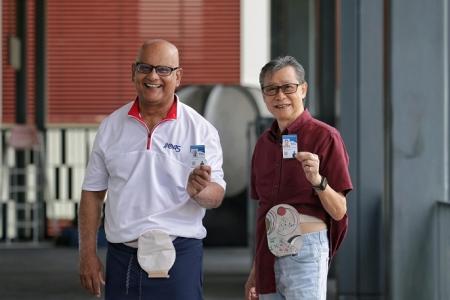New medical ID card improves access for stoma bag users
The Ostomy Association of Singapore (OAS) will be introducing a new medical identification card aimed at improving accessibility and communication for people living with stomas.
To be launched on Ostomy Awareness Day on Oct 5, the card will provide them with a discreet way to communicate their condition, allowing them to request priority access to restrooms or handicap facilities without the need for explanation.
A stoma is a surgically created opening in the abdomen that allows body waste like stool and urine to exit the body when the normal route is not possible due to disease or injury.
It is for people who have undergone operations related to the digestive or urinary systems, such as those with conditions like colorectal cancer and inflammatory bowel disease.
The stoma connects to a pouch or ostomy bag worn outside the body, which collects waste. The bag needs to be changed regularly because it fills up over time.
If not emptied or replaced, a full bag can cause leakage or discomfort or even break, and soiling a person’s clothes. The stoma also needs to be managed with appropriate cleaning and care to prevent irritation or infection.
Mr Ellil Mathiyan Lakshmanan, president and co-founder of OAS, says the OAS medical identification card is expected to benefit about 6,000 people living with ostomy bags in Singapore.
Retiree William Chong has resorted to using the handicap toilet several times, but often gets a “dirty look” from strangers because he is able-bodied.
He says the card would give him the confidence to use a handicap toilet in times of need.
The 74-year-old, a former welding engineer, has been living with an ostomy bag after he was diagnosed with rectal cancer in 2017.
“We need facilities with enough space to manage our stoma pouch, including sinks, a bidet and trash bins for disposing of used ostomy bags. Unfortunately, cubicles in public restrooms lack these essential features, forcing us to navigate our condition in less-than-ideal circumstances,” says Mr Chong, who is married and has two children in their 30s.
According to Mr Lakshmanan, the OAS has had a discussion with the Building and Construction Authority to introduce the ostomy symbol on handicap toilets throughout Singapore.
A pilot programme has already been implemented at Changi General Hospital, where the handicap toilets now feature the ostomy symbol, he notes.
One area where the card will be particularly beneficial is at immigration checkpoints like the airport, says Mr Lakshmanan, 65.
“Many people feel anxious or embarrassed about their ostomy pouch being exposed or touched during security checks. They also often carry extra ostomy supplies in their carry-on bags, which might not always be understood by security staff,” he says.
Presenting the card will allow people to communicate their condition discreetly, thus avoiding embarrassing or awkward situations, he adds.
Mr Lakshmanan says this initiative places Singapore alongside other countries like the United States, United Kingdom and Australia, which have introduced similar cards to help individuals with ostomy bags in accessing handicap toilets and during travel.
Mr Lakshmanan has been living with an ostomy bag after he was diagnosed with rectal and testicular cancer in 2011.
Once, he was caught in a distressing incident while he was on the MRT on the way to his mother’s home.
He noticed his ostomy bag was filling up quickly and had planned to use the restroom after getting off the train. As he passed through the turnstiles, however, the bag burst, causing faeces to trickle down his leg.
Feeling embarrassed, he walked to his mother’s place instead of taking a bus as he did not want to risk people on the bus noticing him. Without a change of clothes, he realised there was no point in going to the public toilet.
Incidents like this, Mr Lakshmanan notes, are common for people with ostomy bags and illustrate the need for better public awareness and accessibility.
Dr Chew Min Hoe, a senior consultant specialising in colorectal and general surgery at colorectal clinic The Surgeons, says the card will benefit patients and caregivers.
“While it is not meant to be viewed as a disability, it does provide some convenience especially for travel and the need for areas like handicap toilets. It reduces some of the potential communication difficulties that our patients may encounter and eases various frustrations,” says Dr Chew.
The card, which will be launched with the support of global medical device company Coloplast, will be available to all members of OAS. The association expects around 50 per cent of its 800 members to apply for the card.
Applications can be submitted through the OAS website (oas.org.sg), and the card will be issued free to members.
Get The New Paper on your phone with the free TNP app. Download from the Apple App Store or Google Play Store now

